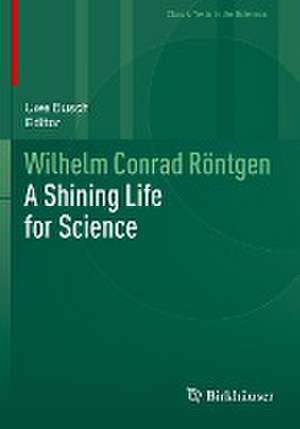Wilhelm Conrad Röntgen: A Shining Life for Science: Classic Texts in the Sciences
Editat de Uwe Buschen Limba Engleză Paperback – 10 oct 2022
However, Röntgen’s scientific work cannot be reduced to this one great discovery alone. He was an excellent natural scientist, and his spirit of research is still an example for many scientists today. Röntgen’s very special interest in precision physics is also more topical than ever.
This carefully curated volume offers a multifaceted view of an outstanding natural scientist and provides insights into his personal legacy.
| Toate formatele și edițiile | Preț | Express |
|---|---|---|
| Paperback (1) | 891.33 lei 43-57 zile | |
| Springer International Publishing – 10 oct 2022 | 891.33 lei 43-57 zile | |
| Hardback (1) | 896.08 lei 22-36 zile | |
| Springer International Publishing – 10 oct 2021 | 896.08 lei 22-36 zile |
Preț: 891.33 lei
Preț vechi: 1086.99 lei
-18% Nou
Puncte Express: 1337
Preț estimativ în valută:
170.56€ • 178.52$ • 141.96£
170.56€ • 178.52$ • 141.96£
Carte tipărită la comandă
Livrare economică 31 martie-14 aprilie
Preluare comenzi: 021 569.72.76
Specificații
ISBN-13: 9783030722456
ISBN-10: 3030722457
Pagini: 265
Ilustrații: XV, 265 p. 142 illus., 100 illus. in color.
Dimensiuni: 168 x 240 mm
Greutate: 0.45 kg
Ediția:1st ed. 2021
Editura: Springer International Publishing
Colecția Birkhäuser
Seria Classic Texts in the Sciences
Locul publicării:Cham, Switzerland
ISBN-10: 3030722457
Pagini: 265
Ilustrații: XV, 265 p. 142 illus., 100 illus. in color.
Dimensiuni: 168 x 240 mm
Greutate: 0.45 kg
Ediția:1st ed. 2021
Editura: Springer International Publishing
Colecția Birkhäuser
Seria Classic Texts in the Sciences
Locul publicării:Cham, Switzerland
Cuprins
Greetings.- Introduction.- Wilhelm Conrad Röntgen - Researcher and Man.- A new kind of rays - The discovery and exploration of X-rays.- Progress in physical X-ray research until 1915.- The work of Röntgen in selected examples.- Epilogue. The Future of X-rays.- Special places.- Dates and facts.
Recenzii
“A unique and valuable aspect of this biography is the detailed analysis of Röntgen’s many scientific contributions in addition to his discovery of x-rays, which seems to have eclipsed his other considerable scientific achievements. … This new biography is an important and well researched contribution to the literature on Röntgen and will appeal not only to radiologists, allied professionals and medical/science historians but also to other scientists who have benefited from his legacy.” (Arpan K Banerjee, RAD Magazine, May, 2022)
Notă biografică
The editor Uwe Busch is a medical physicist and director of the German Röntgen Museum (Deutsches Röntgen-Museum). Together with the newly designed birthplace of Wilhelm Conrad Röntgen, both museums offer a captivating insight into Röntgen's life and work as well as the experience of discovering the fascinating world of X-rays. A world that spans many spatial and temporal dimensions, from the nanoworlds of the microcosm to the infinite expanses of the cosmos and from the past to the future. All the world is full of X-rays. Making good use of Röntgen’s discovery is and remains the goal of science today and tomorrow.
Wilhelm Conrad Röntgen would have had fun doing just that: committing to research to broaden one's horizons, finding profound joy in gaining knowledge and discovering the wonders of natural science for the benefit of humankind.
Wilhelm Conrad Röntgen would have had fun doing just that: committing to research to broaden one's horizons, finding profound joy in gaining knowledge and discovering the wonders of natural science for the benefit of humankind.
Textul de pe ultima copertă
It was one of the great moments of humanity when Wilhelm Conrad Röntgen (1845– 1923) discovered a new kind of radiation on 8 November 1895. He himself modestly called them “X-rays”. Röntgen’s name and his rays became world famous. On 10 December 1901, Röntgen received the first Nobel Prize in Physics. X-rays have lost none of their appeal since then. They still permeate all areas of science, technology and medicine and accompany us in our everyday lives.
However, Röntgen’s scientific work cannot be reduced to this one great discovery alone. He was an excellent natural scientist, and his spirit of research is still an example for many scientists today. Röntgen’s very special interest in precision physics is also more topical than ever.
This carefully curated volume offers a multifaceted view of an outstanding natural scientist and provides insights into his personal legacy.
However, Röntgen’s scientific work cannot be reduced to this one great discovery alone. He was an excellent natural scientist, and his spirit of research is still an example for many scientists today. Röntgen’s very special interest in precision physics is also more topical than ever.
This carefully curated volume offers a multifaceted view of an outstanding natural scientist and provides insights into his personal legacy.
Caracteristici
Lively and comprehensible short biography of Röntgen together with some of his most important works Gives a multifaceted outlook on the future of X-ray research Also contains lesser-known documents from Röntgen's estate










